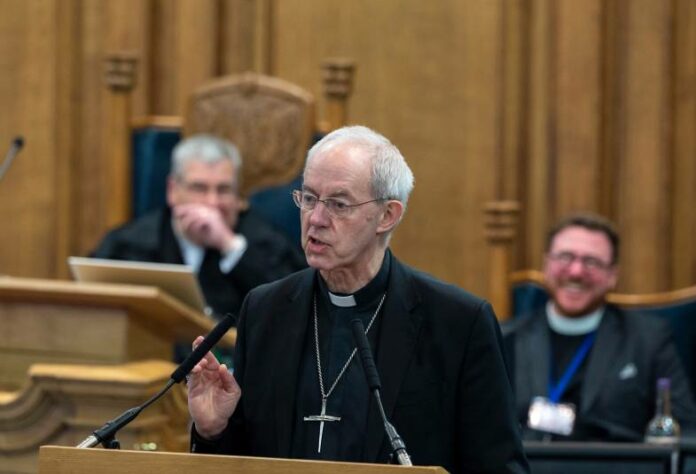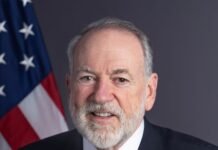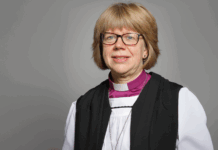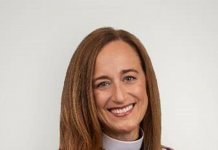May 23, 2024
Moderator Shaw, my very warm congratulations at the beginning of this year of great demands on you, all who work with you, and for your family. And please be assured of my prayers and our prayers and very warm best wishes. Fiona, thank you for your invitation and for your hospitality; it’s wonderful to be here. My hopes rose for a minute when I realised there had to be a motion carried for me to speak. If we were at the General Synod, I would have expected someone to move next business. The rules in England being that, if that’s carried, then the same thing can’t happen at all in the remainder of the five years of the Synod. But unfortunately, you didn’t, for you.
I am, in a moment of slight eccentricity, I suppose, going to use a text today. And the text comes from the Gospel of Luke: ‘if anyone wants to follow me, they must deny themselves – repudiate themselves would be another way of translating it – take up their cross, and follow after me’. That’s the theme of what I want to say
Unlike His Majesty The King, I do not become a Presbyterian when I cross the border, although I’m sure there are some in the Church of England who wish I did, and stayed. I am conscious that you have a very full agenda and you are very, very gracious to have invited me. I know also that you have difficult and at times robust discussions. That is so very different from our General Synod of the Church of England, where peacefully we agree on everything the Archbishops say.
Your Royal Highnesses, Your Graces, it is a great pleasure and a privilege to be in front of you again. However, I am very sorry that I turn up again, when you have fled to a place where you should be as safe as you could be from having Bishops or Archbishops. I’m also conscious that Your Graces are representing His Majesty The King, and I want to assure you, I’m sure with this assembly and all in this nation, of our ongoing prayers for him and the rest of the Royal Family.
When I last addressed this assembly in 2016, it was historic. Not, of course, for being a good speech. It was in the context of the Columba Declaration, which marked a historic turn in our relationships. That declaration, important and momentous as it is, recognised and sealed the warm and appreciative relationship that already existed, it’s just over 100 years since the first time an Archbishop of Canterbury addressed the General Assembly, despite, over the centuries, a complicated history, if I can put it politely. It is a historic agreement, Columba, for it took us out of the predictable circles in which we felt comfortable: Church of England with the old Catholics and the Nordic Lutherans, Church of Scotland with other Lutherans reformed into United Churches, and joined us together in a compact of mutual recognition and shared hope, which has borne great fruit already. Let us give thanks to God for that, for it is His grace alone. Andrew O’Brien / Church of Scotland
Andrew O’Brien / Church of Scotland
Last year, for example, in something that had never happened before, and most certainly not since the Reformation obviously. Pope Francis, Moderator Iain Greenshields, and I made a joint pilgrimage of peace to South Sudan. We went to South Sudan not as leaders, but as servants. More importantly, we went as brothers, as a visible sign of the unity and reconciliation that is possible through the grace of God. Such a visit would have been unthinkable in the very recent past, in our lifetimes. After centuries of division, violence, bloodshed, three different parts of God’s one church journeyed together to a place of profound and terrible, violent conflict. We did so because we sought to be part of answering the prayer of Jesus Christ, that his followers would be one so that the world might know that He came from the Father. I urge you today to continue to pray for the people of South Sudan and the people of Sudan and the region, where the humanitarian crisis is even more severe, and that is saying something, than the Middle East or Ukraine. I learned last night and I want to acknowledge here, the great work that Her Grace the Duchess of Edinburgh has been doing, and continues to do, with women caught up in violent conflict and sexually abused in conflict.
That great crisis in that part of Africa has recently been focused on by the BBC. And also they have focused on other forgotten wars, Myanmar, with immense courage by those who report it. We are called to stand with all those caught in war and conflict and suffering and natural disaster, remembered or forgotten, we must hold their memories before God.
Both our churches have, what in the modern world are, unusual relationships with the state. For all that we sometimes appear close to the centre of things, at the same time we also know that national and political turbulence can hit us hard. We have had much of that in recent years. The death of Her Late Majesty Queen Elizabeth at her beloved Balmoral was a watershed moment in our national life and we continue to mourn her loss and give thanks for her life and her example. And just over a year ago, we witnessed the first Coronation in most people’s lifetimes. Along with Moderator Iain, it was a profound privilege to be part of it. The Coronation Service was the first in history to include the participation of ecumenical leaders beyond our two churches, as well as representatives of other faiths, making it a celebration and affirmation of the changing nature of the society of the United Kingdom, a society which is now recognised by the United Nations as being the most diverse nation on earth.
Coronations are constitutional statements, as well as religious services. The Coronation last year, of 2023, took place in a UK that is, as I just said, far more diverse than 1953, and Scotland plays an enormous role in fostering and reflecting that diversity. As established churches, albeit it in different ways, the Churches of Scotland and England have a duty to protect the diversity of our nation, and the free practice and flourishing of all faiths and beliefs in England and in Scotland. That was a duty articulated by Her Late Majesty, and one that The King has since reaffirmed most powerfully, while also reaffirming his own profound Christian faith.
The Coronation reaffirmed as well that our privileges as the Church of Scotland and Church of England, are, in fact, obligations. As The King said and the liturgy proclaimed, we are not here to be served, but to serve. We must reflect in our General Synod and in our Church Assembly, the diversity of our nation. That is essential. Andrew O’Brien / Church of Scotland
Andrew O’Brien / Church of Scotland
We are here to serve. And we do, through the hard work of local churches and the grace of God, rather than the brilliance, or idiocy, of Archbishops. 35,000 social projects in England including 8,000 food, clothing, or other sorts of banks, education of a million children, day-to-day parish work. Meanwhile, 84% of the Church of Scotland’s congregations are engaged in tackling food poverty, tragic though it is that it exists, as some two-thirds of your churches are involved in school chaplaincy and community development. It is the sovereign work of God that makes that service possible, and the raw heroism of so many people in our churches. Let us praise God and thank them for all they do day by day.
My prayer for this General Election is that people vote in vast numbers, first, treasuring the privilege of citizenship in this democracy. Who they vote for is their choice, not for churches to say. The churches of this land, I am sure, will contribute thoughtfully, respectfully, and as servants seeking the common good. May the new Parliament be also of that mind.
Our two Churches may in one sense or another be established, but we are not state churches. We do not seek popularity, but we are disciples of Christ. Every Christian remains called in Luke’s words to repudiate themselves to take up the cross and to follow Christ. In his address a few moments ago, the Moderator picked up these themes beautifully and powerfully. We are to bear the weight of the cross, sharing the abuse that Christ suffered, enduring the mockery, never holding to position, but instead faithfully Christian, as those who serve.
The discipleship of individual and church is an absolute. There is never a moment when any other loyalty can compete with that owed to God in Christ. All churches share that. Loyalty to God comes before nation, culture, race, or any other claim. Our Churches are in but not of the world, including the world of the state, with that temptation so often before us. We do not interfere in politics, though some of us are sometimes accused of doing so. We do our duty as disciples when we speak into politics. It is duty, not choice. Where there is injustice, we must say so; where there is hunger, we must meet the need and speak against the cause. As Archbishop Tutu once said, when you see many bodies coming down a stream, rather than simply pulling them out, it’s a good thing to go upstream and stop them being pushed in.
We must educate, we must share what we have and not hold on to our goods. It is in doing these things that we meet with God most powerfully. Whatever the issue, whatever the party in power, Christian ethics have, and must go on shaping our national value system. That is revolutionary. It is because of the Christian theme that runs throughout our histories that we defend equality before the law, regardless of your status. That democracy finds its roots when it brings righteousness, that every human being, weak or strong, humanly valuable or not, has equal dignity. We are never utilitarian or consequentialist, those two curses of modern thinking. Andrew O’Brien / Church of Scotland
Andrew O’Brien / Church of Scotland
Moderator Shaw, I know you have spoken out powerfully and prayerfully in solidarity with our brothers and sisters in Christ, in Gaza and across the Holy Land, and with all others who suffer there, and with all the people’s of the Holy Land, Jewish, Christian and Muslim. It is clear that this appalling war will not lead to security for Israel, for which we long and pray, nor to a free and secure Palestinian state, for which we long and pray. As I said recently, I repeat again today, we can only speak to the parties involved in this horror and implore that they choose life and not death. So we continue to call for a ceasefire, for unfettered humanitarian aid, and for the release of all hostages, and for the long term, a resolution that provides for the safety, equality, justice and freedom of all people’s, Israeli and Palestinian.
But we must also remember that in this 21st century, wars are easily imported. Foreign hatreds in nations far away, to misquote Chamberlain, ‘of which we know little’, easily become the conflicts of our own country and our own time and place. The actions of a government abroad in Israel do not ever in any way justify hatred for our fellow citizens of Jewish background.
For the Church of England and the Church of Scotland, our vocations as national churches lead us to abhor antisemitism, that ancient evil. It is on the rise, and we must challenge it. And for the same reason, we must stand alongside those of Muslim faith who are abused and insulted day by day by day on public transport and in many other places.
Whatever is happening elsewhere, both faiths and many others have brought wonderful gifts to the United Kingdom. Being Jewish or Muslim in the UK is never a point of suspicion, let alone hatred. They are our fellow citizens and must be protected by free speech and for free speech, and I would say particularly when it comes to Jewish students, especially in our universities. Our churches must be the mortar that holds together the diverse stones that so beautifully make up the United Kingdom.
I’m grateful that Fiona is a fellow President of the Council for Christians and Jews (CCJ), who this week announced that King Charles will be its new patron, a sign of His Majesty’s ongoing profound commitment and active work in building bridges between faith communities. In the CCJ and elsewhere, we must listen deeply to each other, hear each other’s perspectives, and find good ways forward. We cannot do less.
Amidst all these troubled times, our roles in our national life will no doubt continue to evolve alongside the nation. Whatever the future for the shape and size of the United Kingdom, we will always be sisters and brothers in Christ, obedient to Jesus’ command to love one another, obedient to His command to make disciples, confident in sharing His good news, as an overflowing of the salvation we have received. The Lord is always faithful.
To be the church has never been easy, for it is to be Christ to the world. That will sometimes involve controversy. It will always involve, as we just heard from the Moderator, pastoral caring and praying for those of all or no faith who take on the burden of government. But above all, it necessitates bearing the cross into the places of darkness, as we heard in that beautiful quote about sitting with those who grieve, bearing the cross and following Jesus. A church that chooses any other way is at best a charity with pointy roofs and at worst a deception that will be corrupted.
In discipleship, lived, shared, and proclaimed, we discover afresh each day the faithfulness of God, whose goodness and providence is infinitely greater than our feeble, fragile failures. For in imitating God who carried the cross, we become cross-shaped, and thus God-shaped, and we become a church, a single church of the 21st century, that lives, grows, serves, and glorifies its creator. Thank you for your attention. Andrew O’Brien / Church of Scotland
Andrew O’Brien / Church of Scotland



